Iran's FM Hails Tehran-Riyadh Progress During Syria Visit
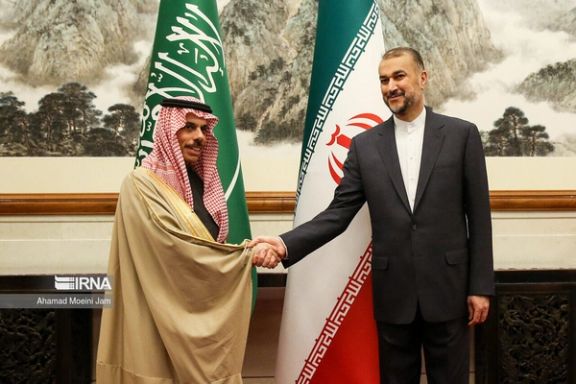
Iran's foreign minister has spoken of the importance of improved Iran-Saudi relations during an official meeting with Syrian President Bashar al-Assad.

Iran's foreign minister has spoken of the importance of improved Iran-Saudi relations during an official meeting with Syrian President Bashar al-Assad.
Hossein Amir-Abdollahian met the Syrian leader, a close ally to Iran, on Thursday during a two-day visit to the country. The Iranian FM praised the thawing of Iran-Saudi relations as mutually beneficial and regionally significant.
The minister also extended an invitation on behalf of President Ebrahim Raisi, for Assad to visit Tehran whilst expressing satisfaction at the renewed engagement of Syria within the Arab League and the enhancement of Syrian-Arab relations.
This takes place against the backdrop of ongoing reports concerning attacks attributed to Israel on positions affiliated with quasi-military groups linked to the Islamic Republic within Syrian territory.
After Damascus, Amir-Abdollahian will travel to Lebanon for discussions with the leadership of Hezbollah, a proxy militant group associated with Iran.
Amid speculation about potential moves by US forces in Iraq and Syria to address vulnerabilities along the Syrian-Iraqi border, which enables Tehran to transport weapons and fighters through Iraq into Syria, Amir-Abdollahian responded to questions during a press conference by urging US troops to depart from the region. He confidently said, "No party is capable of blocking historic transportation routes."
Furthermore, Amir-Abdollahian slammed Israeli airstrikes targeting sites in Syria and cautioned that such actions would inevitably invite retaliation.
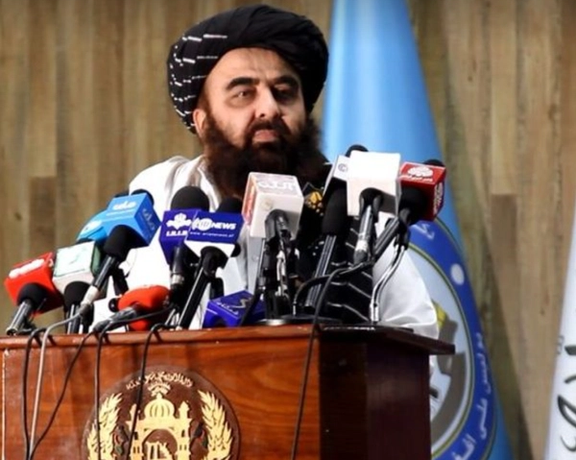
At a religious scholars' gathering in Kabul, the Taliban's Foreign Minister used sarcasm to address countries supporting an all-inclusive government in Afghanistan.
During his address, Amir Khan Muttaqi highlighted the contrast between the number of prisoners held by the Taliban and the reported executions carried out by other countries.
"Our prisons do not have as many inmates as you execute," stated Muttaqi, addressing the countries advocating for the formation of an all-inclusive government. He did not mention any specific nations but many presume his sarcastic remarks were aimed, in part, at the Islamic Republic of Iran, often accused of making opponents disappear and executing them. "In your country, thousands have disappeared, yet nobody dares to ask about it,” Muttaqi said, avoiding directly calling out any one country.
The Taliban's Foreign Minister's remarks come after the international community has consistently called on the Taliban to adopt an inclusive approach in forming a government.
"Do you have an inclusive government?" questioned Muttaqi, his words laced with irony and deliberately undermining the credibility of the governments supporting this initiative.
The Taliban considers the formation of their own system as an internal matter and Mottaqi reiterated the group's stance against external interference.
The international community has also consistently called on the Taliban to adopt an inclusive approach in forming a government. In the past months, tensions between Tehran and Kabul have escalated, resulting in a series of incidents that have strained relations.
One of the deadliest incidents involved a border clash, resulting in the deaths of two Iranian soldiers and one Taliban fighter. The incident followed Iranian President Ebrahim Raisi's warning to the Taliban regarding Iran's water rights under the 1973 treaty. The Taliban responded with defiance, and a former Taliban official's viral video mocked President Raisi's stance.

Iran is slowing the pace at which it is accumulating uranium enriched at 60 percent, the International Atomic Energy Agency (IAEA) is expected to report in September.
Bloomberg reported Thursday that IAEA inspectors are preparing to submit their quarterly report on Iran to members of the agency’s board ahead of their mid-September meeting.
There have been media reports in the past few months that the United States is indirectly negotiating with Iran over a step-by-step approach to relax sanctions in return for a slowdown in Tehran’s nuclear program.
Earlier in August Washington approved the release of $6 billion of Iran’s oil money frozen in South Korea due to US sanctions, in exchange for the eventual release of five US citizens held hostage by the Islamic Republic. This followed a move by the Biden administration in June to allow Iraq to release $2.7 billion it owed Iran for imports of gas and electricity.
The funds will be transferred to Qatar and Oman from where Tehran can use the money for imports of food, medicine and other non-sanctionable goods, according to the United States.
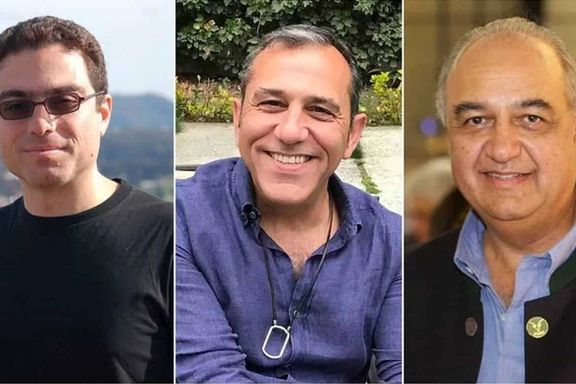
If the IAEA reports a slowdown in Iran’s uranium enrichment, it would strengthen speculations of a non-written and informal deal between Tehran and Washington. While the Biden administration wants to reduce tensions in the region before the US presidential elections next year, it does not want a formal nuclear agreement with Tehran perhaps to avoid Congressional oversight. According to a 2015 law, Congress must have a say in any new nuclear deal.
Already, Iranian oil exports have increased, despite US sanctions, to almost pre-sanctions levels, with the highest shipments reported for August. Iran exported an average of 1.85 million barrels per day, an almost 30 percent jump from previous months.
A Reuters survey published on Thursday showed OPEC’s oil output rose in August as Iranian supply jumped to its highest since 2018, despite ongoing cuts by Saudi Arabia and other members of the wider OPEC+ alliance to support the market.
Iran is exempt from OPEC cuts and its exports have been rising in 2023 despite US sanctions, although views differ as to the exact scale. The overall development, some analysts say, is adding to OPEC+'s challenge in managing the market.
"Iran's output and export data are not transparent and major decision-makers like OPEC+ that adjust their production to balance the market can't be assured of Iran's supplies in the months to come," Sara Vakhshouri of consultant SVB International was quoted by Reuters as saying.
Iran’s oil shipments declined to around 200,000 barrels per day from a high of more than 2 million barrels after the United States withdrew from the JCPOA nuclear deal in 2018 and imposed sanctions. However, Tehran began increasing its exports toward the end of 2020 when President Joe Biden signaled his decision to try to return to the JCPOA. China, Iran’s main customer, apparently seeing signs of a softer approach by the US began increasing its purchases.
Nearly 18 months of talks to revive the JCPOA failed in September 2022, but shortly after secret talks apparently resumed.
The current jump in exports appears to be related to these secret talks between Tehran and Washington. Reuters quoted analysts as saying the higher exports appear to be the result of Iran's success in evading US sanctions and Washington's discretion in enforcing them as the two countries seek better relations.
So far, there is no visible positive signs of higher oil revenues on Iran’s beleaguered economy, because US banking sanctions apparently limit Iran’s hard currency gains from the sales. If the Biden administration also relaxes the banking sanctions, Iran’s annual oil revenues could easily surpass $40 billion.

Iran has accused Israel of plotting to sabotage its defense industry and the production of missiles by supplying defective parts, state media reported on Thursday.
Thursday night, Iran’s government-controlled media announced that a major security announcement would be made in hours, but nothing was announced. Finally, on Friday Iran released a video and a short report showing hundreds of parts said to have been defective and discovered due to the vigilance of intelligence entities.
However, Iranian journalists abroad pointed out that if the parts were indeed defective and reached Iran it means the Islamic Republic spent huge sums to acquire the fake or defective black-market parts, and now wanted to turn the fiasco into an intelligence success story.
"The intelligence unit of the Defense Ministry thwarted one of the largest sabotage plots targeting Iran's missile, aviation and airspace military industry," Iranian state TV said.
"This sabotage was carried out under the guidance of the Zionist intelligence services and their agents."
There was no immediate response from Israel. There have been reports in the past of foreign intelligence organizations succeeding in supplying defective dual-use parts to Iran. In 2010, a malicious computer worm dubbed Stuxnet was discovered in Iran that worked to sabotage Iran’s nuclear program by targeting supervisory control and data acquisition. It was believed that the bug was developer by Israeli and US intelligence services.
An unnamed Iranian defense ministry official was quoted by state media as saying a network of agents sought to introduce defective parts into the production of advanced missiles.

Iran's Deputy Speaker of Parliament has drawn an analogy between Supreme Leader Ali Khamenei's role in the regime and that of a "pilot of the plane."
"The pilot determines the course, and the co-pilot must follow," said Mojtaba Zolnouri, whilst identifying President Ebrahim Raisi as the co-pilot. “If the president doesn't obey the Supreme Leader, people must pay the price,” he added.
On Wednesday, Supreme Leader Ali Khamenei commended President Ebrahim Raisi's administration for making advancements in enhancing relations with neighboring nations. Additionally, Khamenei aimed to justify the record of the Raisi administration by lauding its positive economic figures and "achievements," a stance that many experts and numerous Iranian regime politicians dismiss as political propaganda.
Zolnouri clarified that the president's identification as the nation's ‘co-pilot’ is not due to his proximity to leadership but rather from Raisi’s status among top authorities. Nevertheless, he reiterated that the leader is not subject to presidents' opinions; while officials offer views in expertise and consultation, ultimate decision-making rests with the Supreme Leader. “It's the president who must adhere to this authority,” he said, asserting that deviation from the pilot's decision is impermissible.
Regarding recent nationwide protests, Zolnouri blamed “external influences manipulating the virtual space, coupled with internal issues.” He countered the belief that such events signal the end of the Islamic Republic, asserting that “a system rooted in people's convictions remains resilient despite enemy-generated turbulence.”
The recent protests were the most widespread in the history of the Islamic Republic. The clerical regime has refused to recognize that the unrest triggered by the death in custody of a young woman in September was a genuine popular expression of dissatisfaction at the multiple crises Iran faces.
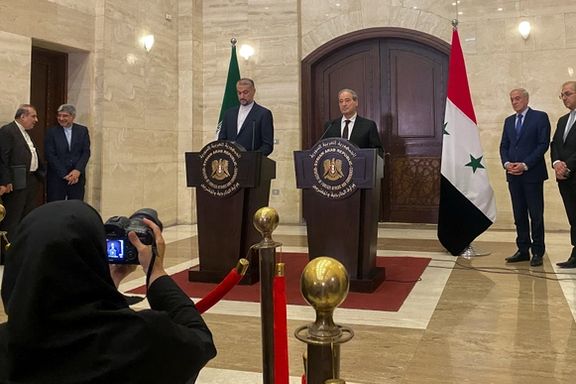
Iran’s foreign minister Hossein Amir-Abdollahian called on US forces in Syria “to return home” and leave the region to its “own people” during a visit to Damascus.
The Iranian foreign minister began a two-day visit to Syria, its close ally on Wednesday and will probably travel on to Lebanon to meet with the leadership of Hezbollah, its proxy militant group.
Unconfirmed reports earlier this month spoke of movements by US forces in Iraq and Syria possibly aimed at plugging holes on the Syrian-Iraqi border that allow Tehran to send weapons and fighters through Iraq into Syria.
Despite denials by Iraqi armed forces and the prime minister’s office, three unnamed Iraqi officials, including a leader of an armed faction stationed in northwestern Iraq, told the London-based Asharq Al-Awsat newspaper that the US was repositioning its troops in the region, possibly preparing for a military operation outside Iraq. Another Iraqi government official told Asharq Al-Awsat that the alleged movements “are limited to locations outside the Iraqi border.”
Amir-Abdollahian’s call for US troops to leave the region was in response to a question during the press conference about these reports. “No party is capable of blocking historic transportation routes,” he retorted.
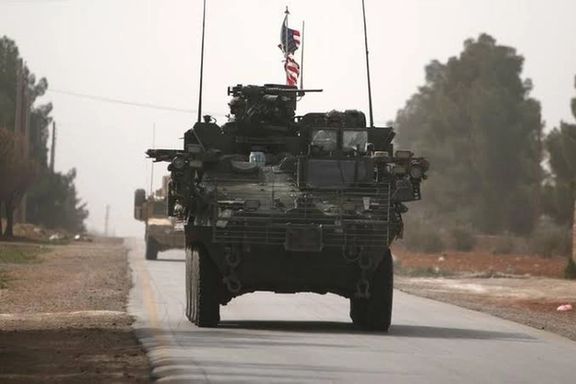
Amir-Abdollahian also condemned Israeli air strikes on targets in Syria and warned that these attacks would eventually face retaliation.
“I would like to strongly condemn the miserable attacks of the fake Israeli entity against Aleppo international airport and civilian areas in Syria and I confirm that the criminal practices by the Zionist entity in the region will not remain without retaliation.”
Israel has carried out hundreds of strikes on targets inside government-controlled parts of Syria in recent years, but it rarely acknowledges or discusses the operations. Often the strikes target Iranian-backed armed groups and concentrations of Iranian weapons transferred to Syria.
Tehran has militarily and financially backed Bashar al-Assad’s government since 2011 when the Syrian civil war erupted. It has deployed its own military personnel, the Lebanese Hezbollah and thousands of militias from Afghanistan, Iraq and Pakistan to provide the manpower Assad lacked to fight against opponents.
Regarding Amir-Abdollahian’s possible visit to Hezbollah in Lebanon, a Tehran-based analyst close to the regime told ILNA news website that Iran’s renewed ties with Saudi Arabia is a topic of interest to the militant group. Massoud Assadollahi said that Hezbollah needs to coordinate its policies with Tehran amid media reports that the Islamic Republic might “abandon” its allies in the region as a concession to Riyadh. It is important for Hezbollah not to be affected by “psychological warfare,” he underlined.
The Iranian pundit also pointed out that this is a critical time for Hezbollah amid heightened tensions with Israel and Prime Minister Benjamin Netanyahu’s threatsagainst militant Palestinian and Hezbollah leaders.
The Iranian foreign minister’s visit to Beirut would enhance mutual understanding with Hezbollah in face-to-face discussions, he argued, and added that when Amir-Abdollahian travelled to Saudi Arabia earlier in August, an Iranian foreign ministry official also visited the Hezbollah in Lebanon.
Assadollahi also linked the foreign minister’s trip to Syria to his earlier travel to Saudi Arabia. “After some time elapsed from Amir-Abdollahian’s trip to Saudi Arabia, he travelled to Syria to inform the leaders of that country about the latest developments…” including the release of Iran’s frozen funds by the United States.






